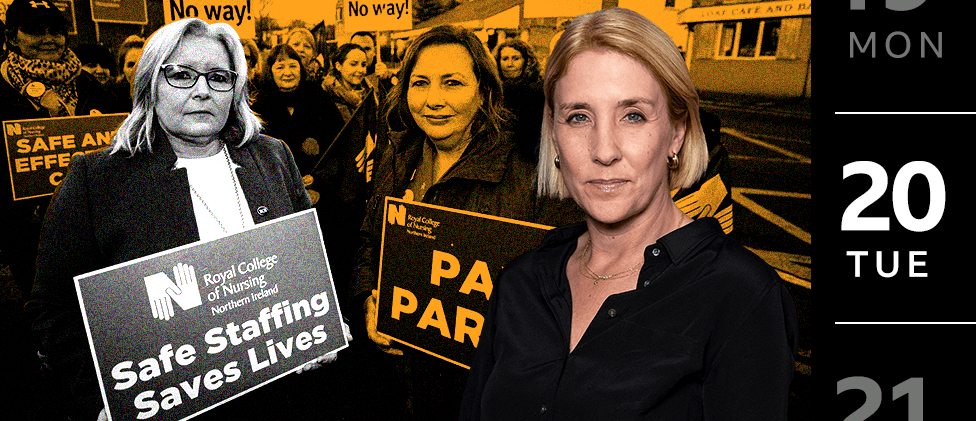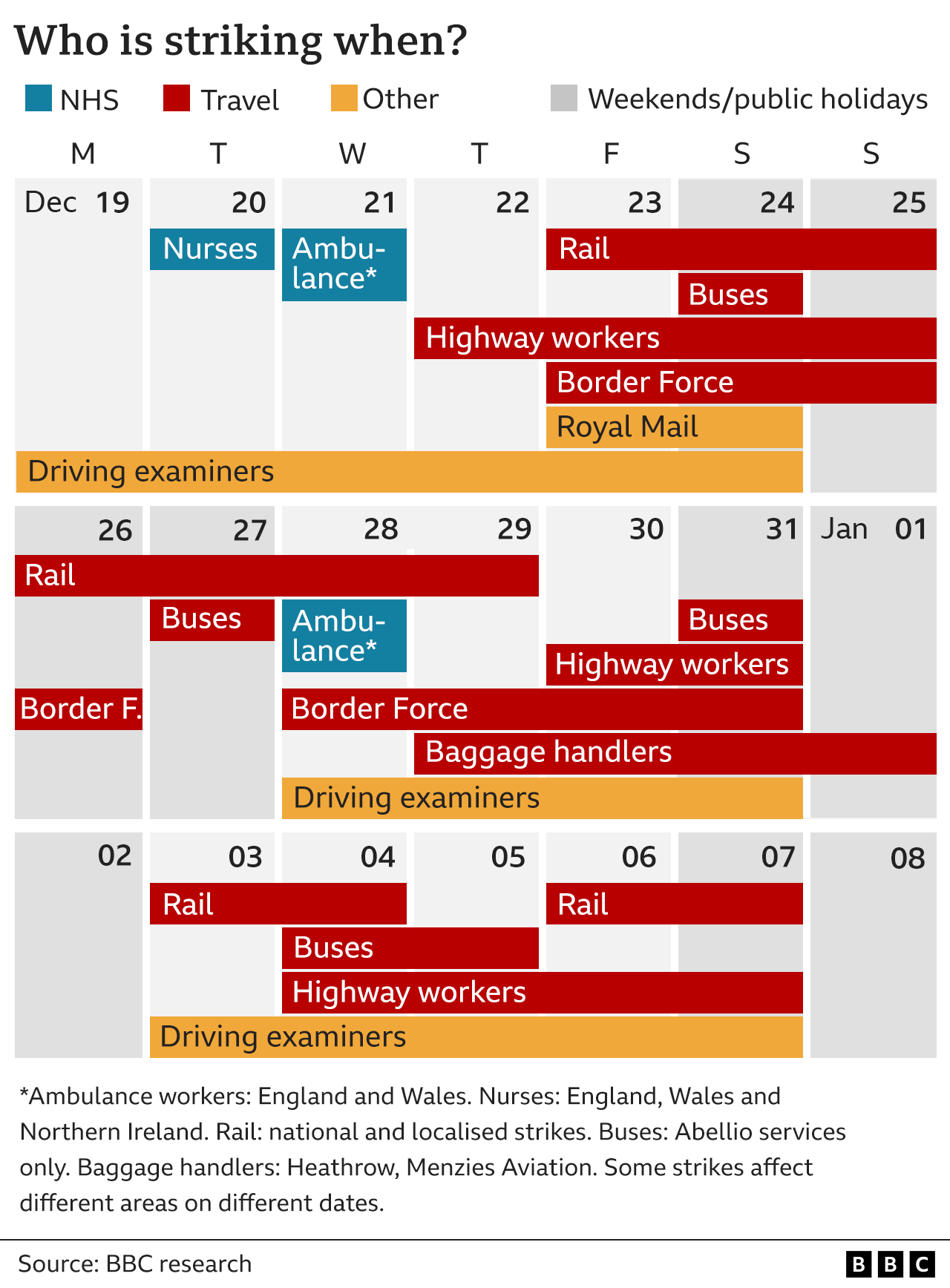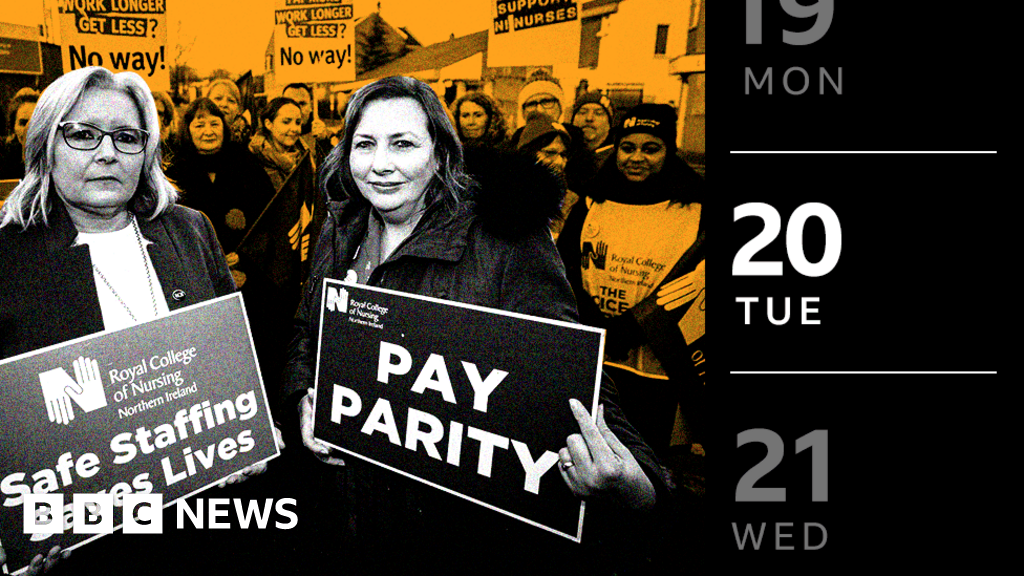
It’s the most wonderful time of the year, so the song goes – that’s unless one of this week’s strikes disrupts your Christmas plans. On Tuesday, nurses are staging another walkout. Patient surgeries and appointments will be cancelled.
Meanwhile, the government in England stands “resolute” on the issue of nurses pay. Cabinet minister Oliver Dowden insisted on Sunday that ministers were “trying to be reasonable”, but that they had a duty to keep finances under control.
Last week, many thousands of nurses stopped work for a day. The same is likely on Tuesday.
This is my latest daily briefing, with lots of useful information.
Medical appointments moved
Members of the Royal College of Nursing (RCN) will walk out again across England, Wales and Northern Ireland.
Last Thursday, the first strike day, at least 19,000 patients had surgeries and appointments postponed – according to figures released by NHS trusts in England and Northern Ireland. In England alone, 9,999 staff were absent from work because of the strike.
If you have a Tuesday appointment, and haven’t been told it is cancelled, the advice is to assume it’s going ahead and don’t call your local hospital to check.
The strike will involve nurses in about a quarter of hospitals and community teams in England, all health boards in Northern Ireland and all but one in Wales (the Aneurin Bevan in south-east Wales).
Check if nurses are striking in your area:
Your device may not support this visualisation
What NHS services will be running?
- Trade union laws state that life-preserving care has to be provided – so all nursing staff are expected to work in intensive and emergency care
- Other services, such as cancer care and kidney dialysis, are also likely to be given some protection
- Routine services will be affected however, such as planned operations like knee and hip replacements, district nursing and mental health care
- Each hospital trust has been negotiating with local RCN representatives about what care should be provided – so levels of care will vary
If there are safety concerns during the strike, nurses could be pulled off picket lines to work.
- What is the dispute about and how will it affect patients?
The RCN is calling for a pay rise of 5% above the RPI inflation rate – currently 14% – against which salary increases are often judged.
NHS staff in England and Wales, including nurses, have already been given an average increase of 4.75% – with a guaranteed rise of at least £1,400 for the lowest paid.
In Northern Ireland, NHS staff are to get a similar increase – backdated to April.
Speaking after last Thursday’s strike, Prime Minister Rishi Sunak said the pay offer to nurses was appropriate and fair. But some health leaders and former Conservative ministers have urged the government to rethink.
In Scotland, RCN members are not striking. They have been considering an updated pay offer from the Scottish government – an average 7.5% increase – which has already been accepted by Unite, Unison and the Chartered Society of Physiotherapy (CSP) – but rejected by the GMB union.
- Does the average nurse earn £34,000 a year?
Driving tests cancelled
Civil servants in the Public and Commercial Services Union (PCS) – including driving examiners – are striking on Tuesday.
It’s part of regional, targeted action – with different areas affected at different times.
Until 24 December, the walkouts are in north-west England and Yorkshire and the Humber.
- Take a look at when other parts of Britain will see PCS strikes

Watch Make Sense of Strikes on iPlayer and find out more about why people are striking and whether industrial action works.

From Tuesday teatime, we will have another strike briefing for you – looking ahead to Wednesday.
But, with Christmas edging closer, we know it’s one of the busiest and most chaotic weeks of the year for many people. So bear the following in mind for the week ahead:
When is the ambulance strike?
Wednesday 21 December – across most of England and Wales. The walkout by the three unions will affect non-life threatening calls only – but it could see people who have had trips and falls not being responded to.
When are Royal Mail staff on strike this week?
Friday 23 and Saturday 24 December – members of the Communication Workers Union (CWU) will walk out on two of the busiest days for pre-Christmas deliveries.
If you still have cards to post, unfortunately you have missed the last Christmas posting days for both first and second-class mail.
When is the next train strike?
There is ongoing disruption and some localised strikes throughout this week and well into next, but a national strike of RMT members is due to start at 18:00 on 24 December until 06:00 on 27 December. However, under normal circumstances, trains don’t run on Christmas Day or Boxing Day anyway.
- East Midlands Trains – Unite union strike on Friday 23 and Saturday 24 December
- CrossCountry – TSSA union strike on Monday 26 and Tuesday 27 December
- GWR and West Midlands Railway – TSSA union strikes Wednesday 28 and Thursday 29 December
Take a look at our full guide to the train strikes or the advice from Network Rail.

Check out our full rundown of all the December and January strikes.
Follow Zoe Conway on Twitter


How are you affected by the strikes? Are you taking part in strike action? You can email: [email protected].
Please include a contact number if you are willing to speak to a BBC journalist. You can also get in touch in the following ways:
- WhatsApp: +44 7756 165803
- Tweet: @BBC_HaveYourSay
- Or fill out the form below
- Please read our terms & conditions and privacy policy
If you are reading this page and can’t see the form you will need to visit the mobile version of the BBC website to submit your question or comment or you can email us at [email protected]. Please include your name, age and location with any submission.
